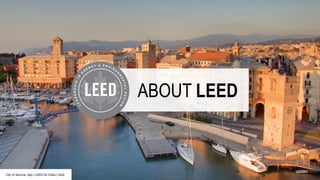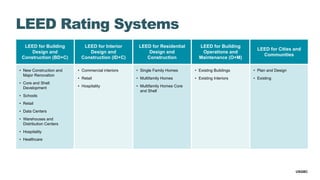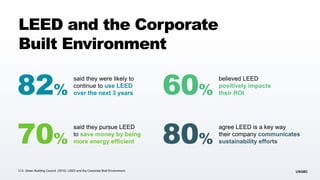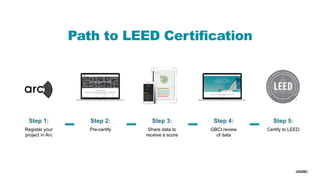About LEED | The world's most widely used green building rating system
- 1. USGBC City of Savona, Italy | LEED for Cities | Gold ABOUT LEED
- 2. USGBC Driving green building Top triggers driving future green building activity: • Client demands • Environmental regulations • Healthier buildings *World Green Building Trends 2018 SmartMarket Report, Dodge Data and Analytics, 2018.
- 3. USGBC Driving green building Business benefits driving green building: • Decreased operating costs • Short payback periods • Asset value increases • Creating healthier indoor environments *World Green Building Trends 2018 SmartMarket Report, Dodge Data and Analytics, 2018.
- 4. USGBC A LEED for every project. LEED addresses new and existing: interior spaces, buildings, homes, communities and cities. Fremont Office Building Seattle, Washington | LEED Gold Photo by Built Work Photography Courtesy Weber Thompson Taikoo Li Sanlitun North Beijing,China | LEED Gold Photo credit: ShuJun The Element House Sarasota, Florida | LEED Platinum Photo credit: Ryan Gamma Photography Hoboken, New Jersey LEED for Cities Gold Photo credit: ShuJun
- 5. USGBC Benefits of LEED certification • Save Money • Consume Less Energy • Use Less Water • Use Fewer Resources • Better Indoor Environmental Quality
- 6. USGBC Prerequisites + Points = LEED Certification
- 7. USGBC Certified 40 – 49 points earned Silver 50 – 69 points earned Gold 60 – 79 points earned Platinum 80+ points earned
- 8. USGBC LEED Rating Systems LEED for Building Design and Construction (BD+C) LEED for Interior Design and Construction (ID+C) LEED for Residential Design and Construction LEED for Building Operations and Maintenance (O+M) LEED for Cities and Communities • New Construction and Major Renovation • Core and Shell Development • Schools • Retail • Data Centers • Warehouses and Distribution Centers • Hospitality • Healthcare • Commercial interiors • Retail • Hospitality • Single Family Homes • Multifamily Homes • Multifamily Homes Core and Shell • Existing Buildings • Existing Interiors • Plan and Design • Existing
- 9. USGBC “Our data proves that the cost of pursuing LEED adds less than 1% of the total project costs while accounting to significant water & energy savings and subsequent payback.” — Heather Stewart, Populous
- 10. USGBC “By building in this manner, the sustainable features of the buildings pay for themselves through their efficiencies within 8 years.” — V. Lane Rawlins, University of North Texas
- 11. USGBC LEED and the Corporate Built Environment 82% said they were likely to continue to use LEED over the next 3 years 60% believed LEED positively impacts their ROI 70% said they pursue LEED to save money by being more energy efficient 80% agree LEED is a key way their company communicates sustainability efforts U.S. Green Building Council. (2015). LEED and the Corporate Built Environment.
- 12. USGBC “In contrast to what most people in the industry think, building Green doesn’t necessarily need to cost more. The key to success is to make green an integrated and natural part of the process from the first day of planning and through the entire life of a building.” — Pierre Olofsson, CEO of Skanska Sweden
- 13. USGBC “Meanwhile, the certification of real estate details whether a property is sustainable or not. This is not an image of improvement to the sector, but a market transformation that makes a building’s qualities transparent and understandable. Not having a property certified constitutes a question of risk management.” — Klaus-Peter Hesse, Managing Director of the German Property Federation (ZIA)
- 14. USGBC 204,000+ LEED Professionals stand out in the building industry with a LEED Green Associate™ or LEED AP® credential that’s designed to demonstrate their knowledge in the sustainable design, construction, operations and maintenance of buildings and communities.
- 15. USGBC Arc™ is a building performance monitoring and scoring platform for LEED-certified projects, providing annual LEED recertification and global benchmarking. The plaque displays a LEED performance score, which reflects the measured performance of the building across five categories: energy, water, waste, transportation and human experience. Arc makes the invisible actionable and offers a means for interaction with the building on multiple levels.
- 16. USGBC
- 18. USGBC Path to LEED Certification Step 1: Register your project in Arc Step 2: Pre-certify Step 3: Share data to receive a score Step 4: GBCI review of data Step 5: Certify to LEED
- 19. USGBC Join USGBC as a member. Choose your level of membership based on your corporate goals. Identify your building portfolio. You’ll work directly with your USGBC Account Manager to register your buildings on the Arc platform. Work towards certification on Arc. Your Account Manager will support all your projects as they work toward certification using Arc. We’ll also help promote your corporate sustainable footprint and brand. Submit projects for certification. With all prerequisites completed & 12 months of data reported, your projects can submit for LEED certification. Certify to LEED.
- 20. USGBC LEED-certified buildings have consistently achieved higher rents compared to their non-LEED counterparts, averaging $4.13 or 11.1% higher rent than non-LEED certified buildings. Cushman & Wakefield. (2021). Green Is Good: Sustainable Office Outperforms in Class A Urban Markets.
- 21. USGBC LEED-certified assets outperform during recession-recovery periods, having lower vacancies than their non-LEED counterparts in the wake of COVID-19. Cushman & Wakefield. (2021). Green Is Good: Sustainable Office Outperforms in Class A Urban Markets.
- 22. USGBC The pandemic accelerated tenant demand for ESG assets. Since 2020, the occupancy rate for LEED-certified assets has increased from 90% to 92% in the U.S., while non-LEED occupancy in the U.S. has fallen from 90% to 88% over the same period. Cushman & Wakefield. (2021). Green Is Good: Sustainable Office Outperforms in Class A Urban Markets.
- 23. USGBC Since 2018, LEED-certified assets held a 21.4% higher average market sales price per square foot over non-LEED buildings. Cushman & Wakefield. (2021). Green Is Good: Sustainable Office Outperforms in Class A Urban Markets.
- 24. USGBC LEED-certified building inventory continues to grow rapidly, making up 46% of urban deliveries in the last 10 years. Cushman & Wakefield. (2021). Green Is Good: Sustainable Office Outperforms in Class A Urban Markets.
- 25. USGBC The LEED-certified office has consistently performed at a premium when it comes to pricing across quality classes and geographies. Cushman & Wakefield. (2021). Green Is Good: Sustainability’s Impact on Office Investment Pricing.
- 26. USGBC Keeping quality and class constant, LEED-certified Class A urban office sales generated a 25.3% price per square foot premium over non-certified buildings, while LEED-certified Class A suburban office achieved a 40.9% premium over non-certified assets. Cushman & Wakefield. (2021). Green Is Good: Sustainability’s Impact on Office Investment Pricing.
- 27. USGBC LEED-certified Class B office achieved the highest premium, 77.5% over its non-certified comparable set. Cushman & Wakefield. (2021). Green Is Good: Sustainability’s Impact on Office Investment Pricing.
- 28. USGBC What are the top two opportunities for the green building industry due to the COVID-19 pandemic? 2021 USGBC / GBCI Community Report
- 29. USGBC What building issues have become more important to the green building community due to the COVID-19 pandemic? 2021 USGBC / GBCI Community Report
- 30. USGBC 35% of all LEED credits relate to climate change Source: usgbc.org/leed
- 31. USGBC Buildings are responsible for almost 40% of global CO2 emissions Source: usgbc.org/articles/role-leed-climate-change-mitigation































